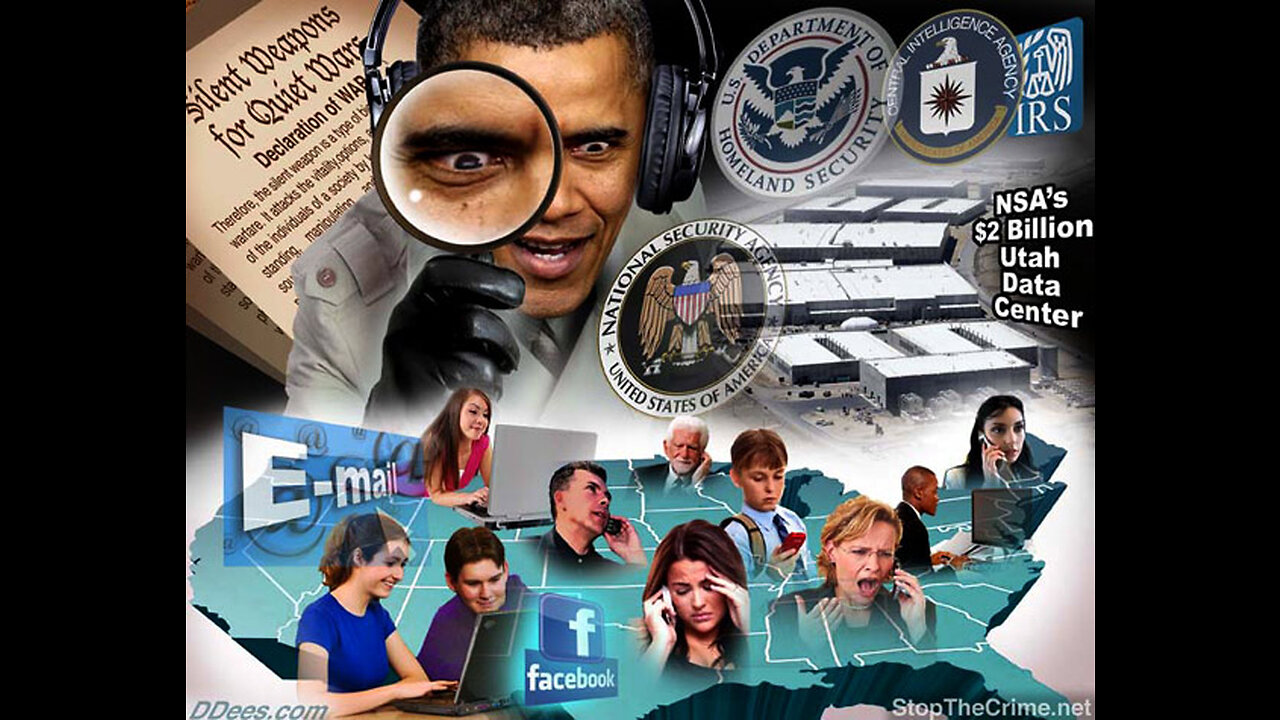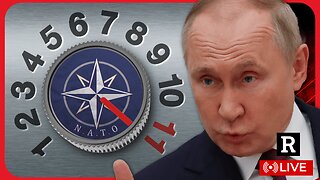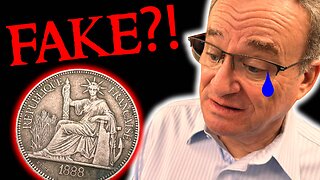Premium Only Content

Tyrannical Foreign Intelligence Surveillance Court Act and Propaganda Administration
Secret Courts History of Intrigue and Abuse and over 800s of million dollars in pay off to Foreign Intelligence Surveillance Court Judges so far. The Foreign Intelligence Surveillance Court, which approved the National Security Agency's collection of U.S. citizens' telephone records, is just one of history's many secret courts. The fundamental premise behind secret courts like the FISC is that some decisions cannot be made in public without jeopardizing a critical national interest, such as security, defense or government administration.
Therefore, the proceedings of a secret court are closed to the public. Court records are kept sealed; they can only be seen under specific conditions by certain people, and much of the information in secret court records may be redacted before viewing by anyone outside the court.
In many secret courts, only one side of an issue is presented to the several judges sitting on the court bench. Secret court decisions are usually final and are not subject to appeal.
The names of judges who preside over secret courts may or may not be known. In most cases, even the fact that a secret court exists, or has arrived at a decision on a particular issue, is not known to the public.
The advantages of a secret court are its ability to make a decision quickly and without public knowledge of its proceedings. Many critics claim, however, that those same qualities undermine the legitimacy of secret courts.
The Star Chamber In medieval England, the Star Chamber was a secret court named for the decorative stars emblazoned on the ceiling of the wood-paneled room in which its judges deliberated.
The Star Chamber oversaw the proceedings of the local courts; it was also able to decide matters involving wealthy and powerful people whose influence made them immune to the decisions of lower judicial bodies.
Over the centuries, the Star Chamber was often used to break up the power of England's land-owning elites. Punishment was swift and could be severe, though the court never condemned anyone to death.
As a flexible organization with wide-ranging powers, the Star Chamber was a valuable ally to kings needing a quick and fair decision on an important matter, sometimes involving a political rival, but often involving crimes like riots, corruption and sedition.
Under some rulers, however, the secretive Star Chamber abused its considerable power to oppress and punish people — often religious dissidents like the Puritans — who had no hope of appeal.
Due to its excesses, the Star Chamber was abolished by Parliament in 1641. The chamber itself was dismantled some years later, though its legendary star-studded ceiling was preserved and can now be seen in Leasowe Castle in Cheshire, England. From the 1950s to the 1970s, the CIA, the U.S. Army and other intelligence-gathering government entities often spied with impunity on civil-rights activists, anti-war protestors, political candidates and thousands of other citizens.
To stem these abuses, the seven-member FISC was authorized by Congress in 1978. The secret court — all hearings are closed to the public and proceedings are considered classified — is responsible for reviewing search-warrant applications drafted by the National Security Agency (NSA).
According to the Federal Judicial Center, "each application must contain the Attorney General’s certification that the target of the proposed surveillance is either a 'foreign power' or 'the agent of a foreign power' and, in the case of a U.S. citizen or resident alien, that the target may be involved in the commission of a crime."
Presiding over the FISC is a three-member Foreign Intelligence Surveillance Court of Review, empowered to critique the decisions of the FISC if a government agency requests a review. Until 2002, the Court of Review had never convened.
With the passage of the USA Patriot Act of 2001, however, the role of the FISC changed somewhat. The Patriot Act extended the time periods during which surveillance can be conducted.
The Patriot Act also increased the number of FISC judges from seven to 11; the four additional judges were appointed by conservative Supreme Court Chief Justice William Rehnquist.
No one argues against the government at FISC Court Former NSA contractor Edward Snowden has asked President for a pardon, and the ACLU, which represents Snowden in the US, agrees Established under the Foreign Intelligence Surveillance Act of 1978, the court’s mandate is to approve special surveillance warrants (FISA warrants) against suspected foreign agents to be used by American federal agencies, typically the NSA or the FBI. One of eleven judges who are tapped from existing posts in the federal circuit can then grant that warrant’s approval. In the court’s history, warrants (and related orders) are approved more than 99 percent of the time. The court’s publicly accessible docket is pretty short—in fact, the website didn't even exist until recently.
“I think one has to be disturbed to learn as we recently have that more than 1,800 applications and [around] more than 1,800 approvals have been made by the court,” Gary Hart, a former Colorado senator who sat on the Church Committee, told Ars. That select senatorial committee was created in the 1970s, and its recommendations paved the way for FISA and FISC.
“I would be a little more comfortable if there were more rejections,” he said. “The glass half-full is that properly trained and qualified judges are hearing persuasive cases. But as a lawyer, this is not a typical judicial proceeding that we're familiar with, because there's no other side. Unlike virtually everything else [in the legal system,] it's not adversarial. The judge hears [the government’s case,] but there's nobody else to argue the other side. If you're a constitutionalist as I am, that's disturbing.” Around the time Edward Snowden got his first job in the intelligence community, I decided to leave my position as an ACLU lawyer in the hope I could make a difference by going inside America’s growing surveillance state. Surprisingly, senior intelligence officials took a chance on hiring me in a unique new office safeguarding civil liberties and privacy. I began work in June 2006.
For the next seven years, I worked with a growing team of internal privacy watchdogs inside the intelligence community. We reviewed the most secret surveillance programs in government, including the major programs that Snowden later leaked. Our job was to ensure those programs had a firm basis in law and included protections for privacy and civil liberties. While I am proud of the work we did, it is fair to say that until Snowden stole a trove of top secret documents and gave them to reporters in 2013, we had limited success. It took a Snowden to spark meaningful change.
The NSA’s operations are essential to national security and to international stability, but it is hard to reconcile them with the values of a free society. Snowden forced the NSA to become more transparent, more accountable, more protective of privacy—and more effective. Today, the NSA’s vital surveillance operations are on a sounder footing—both legally and in the eyes of the public—than ever before. For that, the United States government has reason to say, “Thank you, Edward Snowden.”
In the last four years, there have been more significant reforms to mass surveillance than we saw in the four decades before the Snowden revelations began. Not since the post-Watergate reforms of the Ford and Carter administrations has the intelligence community faced such scrutiny. The NSA has taken painful steps to open up. The most secret of the government’s secret agencies will never be a model of transparency. Still, it has never been more transparent than it is today.
Before Snowden, basic information like the number of targets of the NSA’s mass surveillance operations affected by court-ordered surveillance was a closely-guarded secret. Today, the head of the intelligence community publishes an annual transparency report that provides these and other details.
Before Snowden, the NSA used a secret interpretation of the Patriot Act to amass a nationwide database of American telephone records. Congress has nowreplaced this program of bulk collection with an alternative program that leaves the data with telephone companies.
Before Snowden, the secret court that authorizes intelligence surveillance never heard more than the government’s side of the argument. Now, outside lawyersroutinely appear to argue the case for privacy.
Before Snowden, there was no written order, directive or policy that gave any consideration to the privacy of foreigners outside the United States. When intelligence officials asked lawyers like me about privacy, it went without saying that we were talking about American citizens and residents. Today, for the first time in history, a presidential directive requires privacy rules for surveillance programs that affect foreigners outside the United States. In an agreement with the European Union, the American government has been forced to adopt new protections for foreign data. In the next few years, the NSA’s partners in the United Kingdom will have to justify the surveillance practices of both countries in court against human rights challenges.
In 2017, Congress will review PRISM—a program leaked by Snowden that allows the NSA to obtain e-mails and other communications from American technology companies. The law that provides authority for PRISM expires at the end of the year. The law also gives the NSA access to the internet backbone facilities of American telecommunications companies, in a program called “upstream collection.” Until Snowden leaked details about PRISM and upstream collection, little was known about how the law worked. Thanks to Snowden, the debate over whether and how these programs should continue will be one in which the public is reasonably well informed – unlike the debates in Congress over the Patriot Act in 2001, 2005, 2009, and 2011, over the Protect America Act in 2007, over the FISA Amendments Act in 2008 and 2012, and over the constitutionality of the FISA Amendments Act in the Supreme Court in 2013.
The NSA’s new transparency about its surveillance operations showed that they were designed not to bring about a dystopian society where privacy would be abolished, but to collect intelligence vital to the national security. To be sure, Snowden’s trove of documents and the investigations that followed showed some programs were more effective than others. The same privacy board that reviewed PRISM said that the NSA’s bulk collection of American telephone records had “minimal value.” The board could find “no instance in which the program directly contributed to the discovery of a previously unknown terrorist plot or the disruption of a terrorist attack.” Still, there has been remarkably little evidence of intentional abuse of the NSA’s sweeping powers for improper purposes unrelated to intelligence. None was revealed by Snowden. In response to inquiries from Congress in the fall of 2013, the NSA itself disclosed that itsinspector general had uncovered a dozen incidents over ten years in which analysts used overseas collection to spy on ex-girlfriends.
As a result, the programs Snowden exposed have all survived in some form. In the case of telephone records, the NSA says that the privacy reforms adopted by Congress have actually resulted “access to a greater volume of call records” than before. Many of the NSA’s other mass surveillance programs also enjoy greater public support and legitimacy than they did before Snowden came along. As Jack Goldsmith observes wryly, “These are but some of the public services for which the U.S. government has Snowden to thank.”
Edward Snowden’s actions caused great damage to national security. They should not have been necessary to achieve the sensible reforms of the past four years. That they were represents a failure of leadership by the intelligence community and the national security teams of the previous two administrations. For me, that failure is at least in part a personal one. As a privacy and civil liberties official inside the intelligence community, and later at the White House, my job was precisely to provide top officials with confidential advice about how to ensure that intelligence programs were protective of our liberties. In doing so, I made just the sort of arguments that many have said Snowden should have raised internally instead of compromising classified information. Unlike Snowden, I had direct access to the officials that could have made surveillance reform a reality—and who did so, after the Snowden leaks forced their hand. There is no way a junior NSA contractor could have accomplished more.
Snowden’s critics argue that he should have made his concerns about privacy known through official channels without disclosing secrets and without breaking the law. That would have achieved nothing—even in an imaginary world in which the agency had a perfect system for protecting whistleblowers. Snowden’s concerns were not those of a traditional whistleblower. Snowden’s complaint was not that the NSA was violating its rules, but that its aggressive pursuit of its mission—even as it largely adhered to its existing rules – posed a serious risk to privacy in the digital age. If Snowden was wrong about mass surveillance being an “architecture of oppression,” he was certainly right about that, as many government officials have now acknowledged.
There is an inherent tension between the values of a free society and mass surveillance. For Snowden and his supporters, the answer is easy. End mass surveillance—which is to say, most of what the NSA does. Those of us who believe that the NSA’s far-flung operations are essential to national security and global stability have the harder task of keeping mass surveillance under control.
If Snowden deserves our thanks for both this round of surveillance reform and the next, it is only because the laws and institutions we created to control surveillance had become so obsolete. Intelligence agencies should not need the shock of massively damaging leak to abandon programs that are not working and refine and improve those that are. Disclosing details of classified programs should not be the most effective way to force change.
It makes no sense for the United States government to pursue Snowden like a digital age Inspector Javert while at the same time admitting that his actions strengthened both our civil liberties and our national security. This is especially true because it was the intelligence community’s own shortcomings that made his reckless leak the only effective way to achieve reform.
If Snowden returned to the United States today, of course, he would have to stand trial for disclosing classification communications intelligence, among other serious crimes. This will never happen. Snowden’s lawyers know he would likely be convicted and would face a lengthy prison term. Under federal sentencing guidelines, an offender with no criminal history who is convicted of disclosing “Top Secret” communications information under 18 U.S.C. § 793(d) faces a prison term in the range of 168-210 months, or 14 to 17.5 years. See U.S.S.G.M. § 2M3.2. Snowden might face a considerably longer sentence if convicted of additional charges, or as a result of sentencing enhancements. Naturally, Snowden prefers to stay abroad.
The law does not allow the public interest defense that Snowden says he wants, nor should it. Permitting such a defense would encourage copycats. A Snowden wannabe might hope his lawyer could convince a credulous jury that his leaks also had some positive outcome, even if the benefits were scant. The Snowden disclosures were a unique watershed event, resulting in historic reforms. It is highly unlikely a future leak of classified surveillance information would produce such positive change.
While Snowden might be enticed to return if offered a favorable plea agreement, negotiating such a deal would create poor incentives. One idea, favored by the top lawyer for the intelligence community, was for Snowden to plead guilty to a single felony charge and serve three to five years in exchange for his help undoing the damage he caused. Through his lawyer, Snowden has said he would never plead guilty to a felony. If a plea deal was ever really on the table, Snowden has less to offer every day, as the information he leaked becomes stale and the intelligence community moves on. In any event, the Justice Department rightly objects to negotiating plea agreements with fugitives, to avoid giving those who flee prosecution an advantage over those that do not.
Thousands of U.S. judges who broke laws or oaths remained on the bench Today.
You Can Read Foreign Intelligence Surveillance Court and False Propaganda Administration Secret Canons of Judicial Conduct Tyrannical Law Info. Below:
SECRET CANON 1 ATTORNEY GENERAL AND PUBLIC DEFENDER
1 Prosecutorial Discretion
1(A) We hold the prudent practice of "see, hear and speak no evil" essential as related to the office of the Attorney General [secretly called the "power structure's Mafia"]. Therefore:
1(A)(i) We hold the latitude we give the Public Defender's office compensates for any inequality of justice or prosecutorial misconduct and
1(A)(ii) We ignore the practice of overcharging by the Attorney General regardless of how many are forced into false admissions or plea bargains.
1(A)(iii) We hold overcharging can assist bar members with revenue enhancement and improves efficiency by reducing demands for jury trials and we shall not consider
any guidelines stating otherwise or
the devastation in the lives of those so affected.
1(A)(iv) Since it is the job of the Attorney General to "get" people, any means they use to do so is acceptable since they are the will and voice of the people.
1(A)(v) If the Attorney General's Office violates laws, rules or ethics while "getting" people then let the trial process sort it out. To hell with the following:
those who can't afford effective counsel, a trial or those having a Public Defender and
those who get a Judge skilled in the use of judicial discretion who covers up or ignores prosecutorial misconduct citing "judicial efficiency" and the "duty of the state."
1(A)(vi) Having a bold aggressive Attorney General is of greater benefit to Society than any possible damage to individual life and liberty.
1(B) Public Defender
1(B)(i) The importance we place on justice can always be measured by the amount of resources given the Public Defender in proportion to the amount of resources given the Attorney General.
1(B)(ii) Under staffing and under funding of the Public Defender:
enhances Judicial efficiency and eases the court calendar by promoting plea bargains, suicides, breakdowns, despair, fleeing etc. and
can give us more bang for our buck by turning the Public Defender into an extension of the Attorney General's office and
can demonstrate effective use of the "good cop (Public Defender)" "bad cop (Attorney General)" scenario and
can assist members of the bar with property acquisition and other revenue enhancements.
1(B)(iii) Any uncooperative Public Defender making an issue of judicial or prosecutorial misconduct or ethics violations shall be removed as quickly as possible.
SECRET CANON 2 JUDICIAL BEHAVIOR TOWARDS LITIGANTS
2(A) Confident Litigants
Any litigant appearing confident can be baffled by minutia or Judicially enhanced procedural criteria.
2(B) Judicial Dominance
Occasionally we encounter a litigant who doesn't know we are king. We hold the following tools effective in forcing a resistant litigant into submission:
intimidation by any means
condescending looks, gestures or comments
expressing or instigating anger, outrage or shock
obvious impatience
rushing the proceedings
frequent checks of the time
cautionary glances toward the Bailiff
appearing distressed or uncomfortable like one needing to go to the bathroom
yelling the magic word "NEXT!"
raising unrelated, irrelevant or confusing issues and
loud bangs using the gavel.
2(C) The Need For Attorneys
We shall continue to stress the need to have an Attorney without addressing the fact the overwhelming majority of Americans can not afford them. This is effective in keeping the unresourceful and ineffective at bay.
2(D) The Ultimate Authority
Citizens must be continually led to believe that the Judiciary is the final or ultimate authority in our system of Government.
2(E) Practice Of Law Forbidden
We shall try as best we can to confuse clarifying issues with our inability to give advice. This makes us less apt to stick our foot in our mouth.
2(F) Sincerity Of The Judiciary
We shall never appear insincere when stating absurdities, untruths, mistruths or nonsense. We shall always act like the hearer is unknowledgeable, naive or unseasoned.
2(G) Judicial Fairness
We shall always remember when deciding the significance of an individual to consider money, connections, power, politics and the ability to get media attention in deciding how fair we need to be.
2(H) Judicial Response To Criticism
We forever hold the response to valid or invalid criticism should be indignance.
2(I) Judicial Efficiency
We hold instigating outrage, frustration, anger or other emotions in litigants can be an effective tool to rid ourselves of the unwanted litigant.
2(J) Judicial Handling Of The Ignorant
The client demanding Justice and the full respect of their rights shall be treated with pity and patience.
2(K) Judicial Authority
Due to the authoritative nature of black robes, we shall continue to resist their removal.
SECRET CANON 3 EXPERTS AND EXPERT TESTIMONY
3(A) Efficiency Of Experts
We hold one of the greatest innovations for eliminating ineffective and unresourceful litigants is the ever expanding use of expert testimony.
3(B) Evolution Of Experts
This innovation will reach maturity when we routinely use levels of experts on experts to testify on the validity and expertise of each expert.
SECRET CANON 4 JUDICIAL AND PROSECUTORIAL DISCRETION
4(A) Discretion Defined
We maintain judicial and prosecutorial discretion is doing whatever we damn well please within the judicially prudent guidelines we happen to be following at the time.
4(B) Review Of Discretionary Acts
We shall never promulgate awareness of the real legal issue regarding the use and review of judicial and prosecutorial discretion which is the process of reasoning used in the discretionary act's decision making process. We shall convert the process of reasoning argument into an argument regarding the validity of doing or not doing the discretionary act.
SECRET CANON 5 JUDICIAL OVERSIGHT
5(A) Oversight Immunity
The immunity of everyone overseeing the Judiciary must be maintained to prevent witch hunts and the overzealous from affecting the independence of the Judiciary. The Judiciary does not require the vulnerable or corrective oversight of the masses.
5(B) Judicial Objectivity
We shall always remember the real symbolic reason behind the woman with the blindfold and scale. Objectivity and independence means remaining as blind as possible to wrong doing committed by the Judiciary, members of the bar, and the resourceful and effective.
5(C) Judicial Self-Evaluation
To maintain the independence of the Judiciary, we hold each others rulings to be legally and factually correct regardless of the injustice that results, the facts or the law.
5(D) Judicial Opinions Of Judges
To insure effective oversight of the Judiciary, we shall never criticize each other regardless of the severity of the wrong or the injustice.
5(E) Trust Us, We're Judges
We hold self monitoring and absolute immunity as foolhardy, ineffective and unworkable for everyone except the Judiciary and judicial oversight committees.
5(F) Judicial Job Performance
To allows us to remain unconcerned about upsetting the status quo, we shall keep the public convinced their interference will negatively affect the independence of the Judiciary making Judges afraid to do their jobs.
5(G) The Judicial Mosaic Tablet
We shall forever speak of centuries of Judicial immunities as proof of Judicial immunities' necessity and effectiveness without ever mentioning Judicial wrongdoing has been around as long as Judges.
5(H) Delay = Denied
We hold admission of any Judicial wrongdoing delayed is admission of Judicial wrongdoing denied.
5(I) Complete And Through Review
We hold there is no judicial wrongdoing which can not be diminished by time, levels of hearings and precise dissection , categorization and delegation of related facts and responsibilities.
SECRET CANON 6 JUDICIAL THOUGHT AND LEGAL REASONING
6(A) Judicial Zen
6(A)(i) We hold the logic for our legal reasoning is embodied in the following statement which is understood only by the enlightened: "Because we open a window to the outside of this room does not mean we order, allow, permission or induce any air, dust, molecules, light waves, solar radiation, atoms, or any known or unknown wave or particulate matter from outside to enter this room and are not responsible if said events occur due to the contextual basis of our decisions."
6(A)(ii) We believe in the existence of the metaphysical "third eye." This enables us to selectively avoid looking out our other two eyes.
6(A)(iii) In the beginning was our word. Our word was with God, our word IS God.
6(A)(iv) To think is to be right.
6(A)(v) There is no issue that cannot be split into parts, and there is no part that can't be considered as the whole issue.
6(B) The Dangers Of Common Sense And Factual Integration
6(B)(i) The consideration of the end result our decision has when integrated with the "outside world" can lead to decisions based on "common sense" and must be avoided.
6(B)(ii) "Common Sense" lessens the highly specialized analytical and intelligent nature of the Judiciary creating the undesirable illusion we think like the masses.
6(B)(iii) "Common sense" must not be part of legal proceedings because it cannot be objectively verified.
6(B)(iv) Large scale factual integration with realities of the outside world can negatively affect the perfection of our written word.
6(C) Judicial Self Esteem
We endeavor to remain forever impressed with each other, our performance and our status irregardless of the availability or affordability of Justice.
6(D) Lip Service
We hold the consideration and realities of the quality or delivery of Justice should be given lip service faithfully.
6(E) The Third Person
We hold the "system" shall always be spoken of in the third person as if it operates independently from individuals.
6(F) Judicial Secret Mantra
We may think but not say, "I am the closest thing to God you will ever know."
6(G) Protection Of Status Quo
We shall remember "separate but equal" was around for 100 years. If we hadn't listened to the masses it might still be good law. Therefore we shall keep the shades drawn so reality won't affect or disturb the independence of our decision making process or the Status Quo.
6(H) The Written Word
We hold what looks good on paper must be good.
6(I) The Primary Concern
We shall never consider the end result of our decisions unless it could result in professional embarrassment, loss of status or media attention.
6(J) Public Ignorance
Arrogance is how Citizens define us when they are not fully aware of the nature or scope of our position.
6(K) Judicial Discretion
Judicial Discretion means we can do what we damn well please and is a great tool for denying appeals and judicial wrongdoing.
6(L) The Ultimate Truth
We irreversibly hold reality must conform to our decisions.
6(M) Judicial Precision
We shall forever work on perfecting the art of the polite, dignified, respectful, orderly administered and well twisted screw.
6(N) The Judicial Last Laugh
As related to the Judiciary, the term "over my dead body" is not a cliche but factually correct.
SECRET CANON 7 JURIES AND JURY TRIALS
7(A) Constitution Typo
We hold the right in the Constitution to jury trials in civil matters is a typo.
7(B) Evidence Seen By Jury
We hold the illusion of justice can be created by thoughtful selection of the evidence seen by the Jury.
7(C) Evolution Of Jury Trials
Except for criminal matters for the wealthy, we secretly maintain the elimination of jury trials and continue searching for ways to get that goddamn Constitution out of our way.
7(D) Jury Nullification
We shall remember to act outraged at any mention of the vulgar practice called Jury Nullification.
7(D)(i) Judicial View On Jury Nullification And Instruction
We hold the public does not have the intellectual sophistication to handle the power that comes with jury nullification. This power should only be in the hands of the Judiciary.
7(D)(ii) Jury Instruction
In our continuing efforts to protect the public we must continue to "persuade" juries, via involuntary neurological suppression, into believing:
7(D)(ii)(1) they can only do what we say and
7(D)(ii)(2) they are not allowed to vote their conscience and
7(D)(ii)(3) they should only vote regarding facts and judicially selected evidence, not facts and the law.
7(E) Jury Selection
We must continue to use the word "random selection" when describing the jury selection pool since "random selection" can mean a non specific selection of any group.
SECRET CANON 8 JUSTICE
8(A) The Value Of Justice
We forever hold Justice as the precious and proper administration of laws filtered by legal analysis and unaffected by the end result, even when the end result is the improper administration of laws.
8(B) The Privilege Of Justice
We hold Justice to be more of a privilege than a right. As a result, Justice should never be dispensed casually, freely or indiscriminately.
8(C) Appeals Insure Justice
We hold a denial of justice is an impossibility due to everyone's right of appeal. We hold this to be true irregardless of a litigant's time, money or resources.
8(D) Justice For All
We hold Justice is for all , but only after first deciding which standard of law we will apply, the "spirit of the law" or the "letter of the law" and after;
8(D)(i) the exact terminology and the exact questions are used to describe the injustice in the exact manner we require at the time and
8(D)(ii) said terminology is precisely used with other precise terminology in the exact manner we happen to be requiring at the time and
8(D)(iii) the exact form is used in the exact manner we happen to be requiring at the time and
8(D)(iv) said form is exactly prepared with other exactly prepared forms which we are requiring at the time and
8(D)(v) time requirements are exactly followed with respect to a host of issues that we happen to be requiring at the time and
8(D)(vi) all tools of eliminating litigants have been judiciously attempted such as overcharging, plea bargain, premature dismissals, expert testimony, res judicata,etc. and
8(D)(vii) we can't possibly find a way to use the great catch all "judicial discretion" to eliminate a litigant and
8D(viii) we have made litigants go through as many possible steps as we can conjure up irregardless of the litigant's time or financial resources and
8(D)(ix) any other judicially prudent, meticulous and painstaking attempt at finding a reason to avoid granting Justice unnecessarily.
8(E) Due Process Defined
First, decide how we want the case to go. Second, formulate a legal logic to support our decision. Third, manipulate, dissect or eliminate the facts and evidence to support our decision. Then the rubber stamp doctrine of "judicial discretion" will prevent most decisions from being overturned
SECRET CANON 9 LAW
9(A) The Nature Of Law
We hold the nature of the law similar to "silly putty". We may bend, stretch or reshape the law to say what fits our purpose.
9(B) The Flexibility Of Law
We hold the law is like the Bible, it can be made to say anything we want with enough quotes, viewpoints and cross references.
9(C) The Standards Of Law
The "letter of the law" and the "spirit of the law" are two different legal standards of Justice and the Law. We may choose the standard that suits our fancy.
9(D) The Equal Application Of Law
We hold the law must always be equally applied, depending on the circumstances and the litigant.
9(E) No One Above The Law
We hold no one is above the law. [Tee hee hee, wink wink]
SECRET CANON 10 ON AND OFF THE RECORD
10(A) Purpose Of Back Room Meetings
We will make ample use of back room meetings to keep litigants in the dark. They can not and should not see or understand the process of litigation.
10(B) Back Room Meetings Enhance Justice
10(B)(i) We hold injustice can not result from back room meetings because if wrongdoing occurs, clients can sue their Lawyers for malpractice.
10(B)(ii) To avoid complications, we avoid mentioning or considering the resources required for or the near impossibility of finding a lawyer to sue another lawyer.
10(C) Health Benefits Of Back Room Meetings
We hold the practice of moving to and from back room meetings can assist with circulation, constipation, rectal itch, gaseous emissions, breathing and caloric consumption.
10(D) Back Room Meetings Are Open Court
We shall go off the record as much as possible being careful to maintain the illusion of "open court."
10(E) The Unmentionable Contract
We prefer clients not be present in back room meetings while never mentioning we hold the client to whatever their lawyer agrees to in these meetings.
10(F) Accuracy Of Record
We resist new equipment that transcribes immediately. We prefer to have the option of making corrections to insure accuracy before the record is transcribed.
10(G) Consequences Of Clients At Back Room Meetings
We hold a client's presence at back room meetings can result in inappropriate evaluations of Judicial and Attorney conduct and expertise.
SECRET CANON 11 PRO SE'S, THE POOR AND INDIGENTS
11(A) The Protection Of The Public
11(A)(i) We hold the need to protect the public from the dangers of self representation far outweighs the fair impartial administration of Justice. To protect the public from the dangers of self representation we shall:
11(A)(i)(1) approach the Pro Se, poor or indigent's complaint from this objectively protective and compassionate position, "Is there anyway I can deny this petition?"
11(A)(i)(2) use Judicially prudent unbiased techniques to intimidate, frustrate, anger, nit pick, postpone, play with or in any other way rid ourselves of a Pro Se, poor or indigent litigant.
11(A)(i)(3) assist the Pro Se, poor or indigent in a resolution by bending or ignoring the rules on ex parte communications.
11(A)(i)(4) nurture an unfriendly environment in a dignified and polite manner.
11(A)(i)(5) minimize or ignore Judicial, Court or Attorney errors while magnifying any errors of the Pro Se, poor or indigent litigant.
11(A)(i)(6) politely move on to the next case before the Pro Se, poor or indigent is finished. This will assist eliminating them later with arguments such as Res Judicata.
11(B) Disposition Before Written Decisions
11(B)(i) It is best to be rid of a Pro Se, poor or indigent litigant before having to render a decision requiring written legal analysis.
11(B)(ii) If forced to render a written opinion on a Pro Se , poor or indigent case, we will stick to or switch to the arguments that validate our desired position.
11(B)(iii) In Pro Se poor or indigent cases, we prefer unpublished opinions. This makes it easier to perpetuate non sequiturs and pseudo-justice while maintaining the illusion of due process.
11(C)(iv) We hold "giving the dog a bone" occasionally is good practice and gives us some ammunition when our integrity is questioned.
11(C) The Superiority Of Bar Members
When dealing with a Pro Se, poor or indigent litigant, we shall always give credence to members of the Bar's arguments, regardless of how absurd or off point they are.
11(D) The Superiority Of The Status Quo
In cases involving the system, member of the bar or the status quo versus the Pro Se, poor or indigent litigant make sure the system, member of the bar or the status quo prevail regardless of how you must ignore or pervert the issues .
11(E) Irrebuttable Presumption Of Pro Se Ignorance
We hold the Pro Se, poor or indigent litigant does not or can not understand the complex issues of litigation.
11(F) Methods For Smart Alec Pro Se, Poor Or Indigent Litigants
If a Pro Se, poor or indigent does understand the issues we shall:
11(F)(i) repeatedly bait them to go off point or
11(F)(ii) convince them they don't understand or
11(F)(iii) diligently look for and focus on a point they don't understand clearly or
11(F)(iv) continue until they err, running with the error to make a touchdown.
11(G) Attitude Toward Naive Pro Se, poor or indigent Litigant
We shall always take a patient but condescending attitude with a Pro Se, poor or indigent litigant that is so naive as to demand and expect fair, impartial Justice and the law applied as written.
11(H) The Inability To Practice Law
Our inability to give legal advice or advocate is restricted to Pro Se, poor or indigent litigants, not members of the bar, the fictitious corporate person or the State.
11(I) The In Forma Pauparis Hearing
We hold when questioning a litigant attempting to file In Forma Pauparis regarding what they own to never reveal the legal definition of "own" is to have and hold title. This effectively eliminates the unresourceful and ineffective and our ass is covered.
11(J) The Judicial Nightmare
The nightmare of having the public believe they have a chance of receiving justice without a lawyer must be avoided at all costs. The Courts are best operated as a "members only" organization.
SECRET CANON 12 PUBLIC AND THE MEDIA
12(A) Appeasing The Public
12(A)(i) Exemplifying one case where the system worked can cover a multitude of sins.
12(A)(ii) Occasional written opinions regarding concern about justice for the poor are effective in perpetuating the myth that we are continually and aggressively working on this issue.
12(A)(iii) When all else fails, schedule future hearings.
12(B) Handling Of Liability
We hold where liability of the privileged, the system or the status quo is involved, admission of wrong doing or error causes more harm than good. However, occasionally throwing the dog a bone can cover a multitude of sins.
12(C) Objective Public Image Maintained
We will continue to resist equipment in legal proceedings that can record emotion, attitude or personality traits which can affect the course of proceedings.
12(D) High Profile Trials
High profile trials are an opportunity to show Americans the way the system should work. This is advantageous to the overwhelming majority of Americans who would never see it otherwise. This also minimizes complaints of the non-existence of an effective judicial system.
12(E) The Priority Of The Public Trust
We hold the public trust must be maintained regardless of how we have to lie, cheat or steal to maintain it.
12(F) Media Focus and Public Attention
We hold hearings on any judicial wrongdoing should never be conducted when media attention or public awareness is high.
12(G) Judicial Verbal Equivalents To The Finger
When dealing with the public and the media, we shall never forget the power of the statements,
"You don't understand the intricacies and operations of law" and
"It would be inappropriate for me to comment" and
"Many times Judges have knowledge of details not known by the public."
SECRET CANON 13 RULES AND PROCEDURES
13(A) Value Of Justice
We hold Justice should always be fought for, never freely handed out.
13(B) The True Essence Of Procedure
We shall strive to find the breaking point in each individual.
13(C) Productivity
To create the illusion of productivity we shall forever hold Justice in front of litigants like a carrot on a stick.
13(D) Administration Of Justice
We hold the selective and selectively meticulous application and adherence to rules and procedure can be used to override the administration of Justice if the administration of Justice requires it.
13(E) The Obstacle Course Objective
We shall always remember the amount of Citizens we have to deal with is contingent on the number of hoops we require they go through.
13(F) Time Of The Essence
We shall remember time is on our side and the passage of time can create the illusion of thoroughness.
13(G) Due Process
We hold the term "due process" can imply the payment of money.
SECRET CANON 14 THE SUPREMACY OF THE CORPORATE PERSON
14(A) The Corporate Person v. The Individual
14(A)(i) The fictitious Corporate person shall be held in higher esteem than the individual.
14(B)(ii) We hold individuals are better represented by a corporate entity. This is more efficient and results in fewer demands for Rights or Justice.
SECRET CANON 15 LYING AND TRUTH TELLING
15(A) The Ethics Of Lying
15(A)(i) To maintain the ethical nature of legal proceedings, the word "lie" is considered vulgar as related to statements from the Judiciary or members of the bar.
15(A)(ii) We shall use terms like misspoke, spoken in error, inadvertent utterance, involuntary neurological transmission, spontaneous somnambulistic manifestation or some terminology denoting non deliberate intent when describing the statements in question.
15(A)(iii) We hold the near impossibility of the existence of the lie because objective reality can have countless varied creative interpretations and constructive descriptions. Calling another's view of objective reality a lie shows a lack of intelligence, creative viewpoints and critical thinking skills.
15(B) The Ethics Of Truth
15(B)(i) We hold truth is that which is least damaging to the status quo.
Nevertheless, the status quo is clearly not in American interests. Snowden’s exile in Russia is a continuing embarrassment. Snowden has become a potent symbol for privacy and civil liberties, human rights, and an open internet in which surveillance operations are controlled by law. His presence in Moscow is a gift to Vladimir Putin, allowing the Russian president to cynically pose as a defender of digital human rights. Every time Snowden makes a virtual appearance before his admirers, the unspoken message is that he has been forced to seek asylum because the United States opposes these values. The message is no less effective for being false and unfair.
By contrast with a trial or a plea agreement, a pardon is an unreviewable act of discretion by the president. Presidents have used them not only to correct injustices, but also when the broader interests of the nation outweigh the importance of punishing a crime even where some punishment is clearly deserved. Gerald Ford pardoned Richard Nixon to help the country move beyond Watergate. Jimmy Carter pardoned draft dodgers to close the chapter on the Vietnam War.
Pardons are exceedingly rare. A pardon sets no precedent and so creates no incentives. Future leakers could not count on one. Even if Snowden does not deserve a pardon for what former Attorney General Eric Holder called his act of “public service,” we should give him one and move on. We are the good guys. It is time for the world to know it again.
-
 5:01
5:01
What If Everything You Were Taught Was A Lie?
23 days agoTrue Mystery Of Tartaria World's Fairs History We've Been Told Us Is A Lie Chicago 1893
6.03K14 -
 2:22:06
2:22:06
WeAreChange
4 hours agoPSYOP Spreads: Drones Shut Down Airport In New York!
54K24 -
 1:31:18
1:31:18
Redacted News
7 hours agoEMERGENCY! NATO AND CIA ASSASSINATE TOP RUSSIAN GENERAL, PUTIN VOWS IMMEDIATE RETALIATION | Redacted
197K285 -
 56:45
56:45
VSiNLive
6 hours ago $5.02 earnedFollow the Money with Mitch Moss & Pauly Howard | Hour 1
59.2K2 -
 52:44
52:44
Candace Show Podcast
6 hours agoMy Conversation with Only Fans Model Lilly Phillips | Candace Ep 122
73.9K252 -
 LIVE
LIVE
tacetmort3m
6 hours ago🔴 LIVE - RELIC HUNTING CONTINUES - INDIANA JONES AND THE GREAT CIRCLE - PART 5
211 watching -
 26:52
26:52
Silver Dragons
5 hours agoCoin Appraisal GONE WRONG - Can I Finally Fool the Coin Experts?
27.7K2 -
 UPCOMING
UPCOMING
Bare Knuckle Fighting Championship
11 hours agoBKFC on DAZN HOLLYWOOD WARREN vs RICHMAN WEIGH IN
19.3K -
 6:49:16
6:49:16
StoneMountain64
9 hours agoNew PISTOL meta is here?
31.2K1 -
 20:58
20:58
Goose Pimples
11 hours ago7 Ghost Videos SO SCARY You’ll Want a Priest on Speed Dial
17.8K3